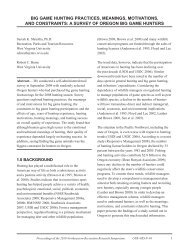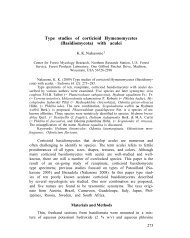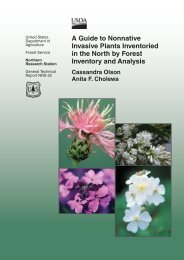Proceedings of the 2009 northeastern recreation research symposium
Proceedings of the 2009 northeastern recreation research symposium
Proceedings of the 2009 northeastern recreation research symposium
Create successful ePaper yourself
Turn your PDF publications into a flip-book with our unique Google optimized e-Paper software.
Table 2.—Assessment <strong>of</strong> <strong>the</strong> global sustainable tourism criteria<br />
How important are <strong>the</strong>se considerations in your decision? (5 point scale, 1 = not very important,<br />
5 = very important)<br />
The international or national legal protection <strong>of</strong> employees is respected, and employees are paid<br />
a living wage.<br />
The company has implemented a policy against commercial exploitation, particularly <strong>of</strong> children<br />
and adolescents, including sexual exploitation.<br />
The activities <strong>of</strong> <strong>the</strong> company do not jeopardize <strong>the</strong> provision <strong>of</strong> basic services, such as water,<br />
energy, or sanitation, to neighboring communities.<br />
The company is equitable in hiring women and local minorities, including in management<br />
positions, while restraining child labor.<br />
The company actively supports initiatives for social and infrastructure community development<br />
including, among o<strong>the</strong>rs, education, health, and sanitation.<br />
Local residents are employed, including in management positions. Training is <strong>of</strong>fered as<br />
necessary.<br />
South America. Th e respondents had traveled less <strong>of</strong>ten<br />
for business although 12 had taken business trips to<br />
Central America or <strong>the</strong> Caribbean, 9 had been to Asia or<br />
Africa, 5 had gone to Europe, 4 had traveled in North<br />
America, and 2 had been to South America. Despite<br />
economic concerns, 41 percent <strong>of</strong> respondents said that<br />
<strong>the</strong>y were “very likely” or “somewhat likely” to vacation<br />
abroad in <strong>the</strong> next 12 months.<br />
Almost half <strong>of</strong> <strong>the</strong> survey respondents did not answer<br />
<strong>the</strong> demographic questions but, <strong>of</strong> those who did, more<br />
than half were male and <strong>the</strong> vast majority were more<br />
than 40 years old. Th e most frequently reported annual<br />
household income category was $25,000 to $49,999.<br />
More than 50 percent <strong>of</strong> <strong>the</strong> group had completed at<br />
least some college. Of <strong>the</strong> 52 respondents who provided<br />
<strong>the</strong>ir employment status, 25 were working full time,<br />
9 were working part time, and 16 were retired. Of <strong>the</strong><br />
51 who answered <strong>the</strong> question about marital status, 36<br />
were married. Approximately half answered <strong>the</strong> question<br />
about <strong>the</strong> country <strong>of</strong> <strong>the</strong>ir birth. Th e vast majority were<br />
born in <strong>the</strong> United States.; o<strong>the</strong>r listed countries <strong>of</strong> birth<br />
included India (2 people), Germany (1 person), New<br />
Zealand (1), Poland (1), and Taiwan (1).<br />
5.0 DISCUSSION<br />
Th e survey data suggest that health tourists are costsensitive<br />
and care about <strong>the</strong> needs <strong>of</strong> local workers<br />
at health tourism destinations. Given this interest in<br />
supporting sustainable tourism, it is not too late to build<br />
sustainable practices into health tourism strategies. While<br />
<strong>the</strong> quality <strong>of</strong> patient care is important for health tourists,<br />
<strong>the</strong> local population should not receive substandard care<br />
at <strong>the</strong> same facilities. Human rights organizations <strong>of</strong>ten<br />
list “health” as one <strong>of</strong> <strong>the</strong> most important human rights.<br />
Dr. Margaret Chan, director general <strong>of</strong> <strong>the</strong> World Health<br />
Organization, asserts: “Our greatest concern must always<br />
rest with disadvantaged and vulnerable groups. Th ese<br />
groups are <strong>of</strong>ten hidden, living in remote rural areas or<br />
shantytowns and having little political voice” (World<br />
Health Organization 2007, p. 1).<br />
While <strong>the</strong> GSTC criteria about employing local<br />
residents were only moderately important to survey<br />
respondents, it is a real threat to local communities when<br />
a workforce is imported to work in <strong>the</strong> tourism industry.<br />
Imported workers compete with local employees and<br />
diminish tourism’s social and economic benefi ts in local<br />
communities (Smith and Puczko 2008).<br />
<strong>Proceedings</strong> <strong>of</strong> <strong>the</strong> <strong>2009</strong> Nor<strong>the</strong>astern Recreation Research Symposium GTR-NRS-P-66<br />
Mean<br />
Std.<br />
Deviation<br />
3.72 1.14<br />
3.67 1.17<br />
3.64 1.14<br />
3.63 1.13<br />
3.42 1.28<br />
3.30 1.21<br />
Local and fair-trade services and goods are purchased by <strong>the</strong> business, where available. 3.14 1.21<br />
A code <strong>of</strong> conduct for activities in indigenous and local communities has been developed, with<br />
<strong>the</strong> consent <strong>of</strong> and in collaboration with <strong>the</strong> community.<br />
The company <strong>of</strong>fers <strong>the</strong> means for local small entrepreneurs to develop and sell sustainable<br />
products that are based on <strong>the</strong> area’s nature, history, and culture.<br />
3.14 1.18<br />
3.02 1.33<br />
101
















